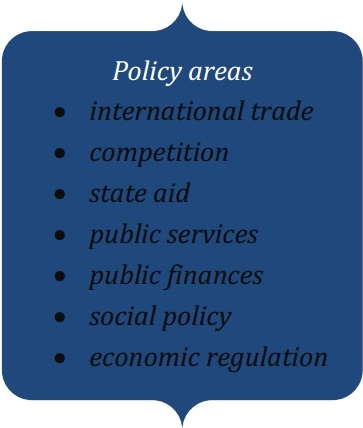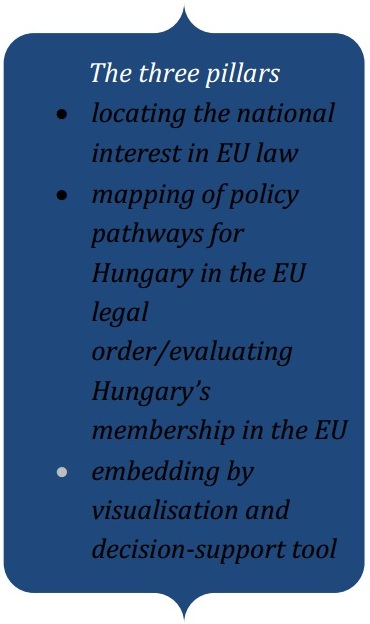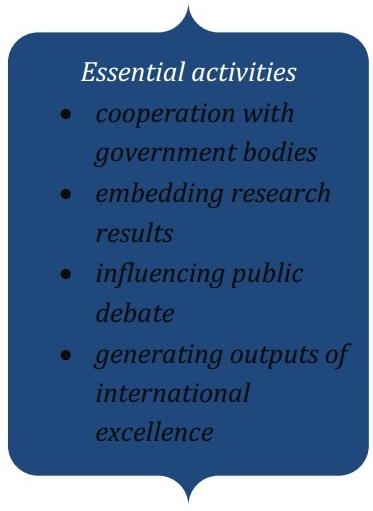MTA Lendület-HPOPs Research Group
Policy Opportunities for Hungary in the European Union - the analysis of the legal framework
Executive Summary of the Research Project
Download
The research group was established for the period between 2013 and 2018 to examine the opportunities available under the European Union legal framework for Hungary to achieve its own policy objectives and to evaluate on that basis the performance of Hungary as a Member State of the European Union. Our work is based on the premise that Hungary is an autonomous actor in the European Union policy arena, the holder of diverse economic and social interests, and for government and administration in Hungary the law of the European Union primarily represents boundaries and signposts in the policy process. The fundamental principles of the EU legal framework, such as subsidiarity, diversity and neutrality, and their detailed manifestation in primary and secondary EU law offer opportunities for the Member States to realise their policy objectives and shape society and the economy according to locally formulated value- and other normative frameworks, while requiring Member State governments to adhere to the outlines of a shared economic and social model, to eradicate discrimination from national laws and governance, and to observe the requirements of good governance and the rule of law. We are especially interested in exploring what opportunities are available for Hungary in the European Union for economic and social transformation and  consolidation in the post-transition and post-financial and economic crisis environment. The analytical and evaluative information generated by our research will be made available to enable retrospective and forward looking self-assessment by government and also to contribute to the policy and governance planning of the next 20-30 years. This process will be assisted by a legal visualisation and decision-support tool, developed by the research group in collaboration with partners, which will also be available for the training of government officials.
consolidation in the post-transition and post-financial and economic crisis environment. The analytical and evaluative information generated by our research will be made available to enable retrospective and forward looking self-assessment by government and also to contribute to the policy and governance planning of the next 20-30 years. This process will be assisted by a legal visualisation and decision-support tool, developed by the research group in collaboration with partners, which will also be available for the training of government officials.
Our focus is predominantly national and our work is motivated by necessities formulated in Hungarian policy-making and governance. We will approach EU law and policy from viewpoint of the Hungarian government and administration and from the perspective of policy priorities and objectives formulated on the national level. Our aim is to present the legal framework of the European Union to Hungarian decision-makers in a format which is accessible and available for developing national strategies and policies, and also to use legal requirements originating from the European Union to analyse and evaluate legal and policy developments in Hungary. The focus on Hungary and the national level, however, will not prevent the research project from producing internationally relevant theoretical and conceptual observations and practical outputs. Locating and conceptualising the national interest in EU law is only possible from the domestic viewpoint. Linking subsidiarity and diversity with EU constitutional and legal theory and the law also necessitates approaching these issues from the perspective of individual Member States. Exploring the boundaries of the economic and social model manifested in the provisions of EU law and of promoting locally generated value-systems and economic and social constructions is impossible without taking into account the national. The mapping of the EU legal framework as providing decisional pathways and signposts for the Hungarian decision-maker is expected to produce outputs of practical relevance which could find application on the European level and in other Member States.

The research project consists of three distinct pillars. Work on the different areas is distributed in a linear fashion during the five years of the project.
In the first year, we will undertake basic research to locate the national interest in EU law and to conceptualize the EU legal order as a legal framework providing boundaries and decisional pathways for national policy makers. In the second, third and fourth year, building on the theoretical premises developed in the first year, we will map the legal boundaries and signposts of policy pathways available for Hungary in the European Union in specific policy areas and evaluate in general and in these areas the performance of Hungary as a Member State pursuing autonomous and defined policy objectives. In the final years of the project, we will work on the dissemination and embedding of the results of our work. Alongside producing traditional academic publications, we will organise a series of workshops with government partners to discuss our results, how the information provided by them was integrated into our work and how our outputs could be integrated into their work. We will also generate, together with partners in information technology and government informatics, a legal visualisation and decision-support tool which will be available for use in the preparatory phase of the policy process for mapping policy pathways and decisional routes as determined by the European Union legal framework.
The theoretical and conceptual issues revisited by the research group include
- locating the national interest in the EU economic and social constitution
- the national interest, subsidiarity, diversity and the EU constitution
- the EU legal order as providing pathways and signposts for national policy-making
- the national interest, the Member States and EU governance
Members of the research group will closely monitor current legal and policy developments in the relevant areas in Hungary and in the European Union, and they will provide regular reflections on those developments on the English and Hungarian expert blog on the research group’s website, which is hoped to become the central forum of legal and policy debates on Hungary’s membership in the European Union.
 The research group is managed and operated under the coordination of the research group leader by four post-doc level researchers, including the research group leader, based in the Hungarian Academic of Sciences - Centre of Social Sciences - Institute of Legal Studies. The research group will be joined by three pre-doc level research assistants in the next three years who will conduct research leading to a PhD in a subject area covered by the research project under the supervision of the research group leader. The quality of our work is monitored by a Steering Committee, consisting of senior academics and government officials, the members of which will be invited to contribute to the academic, dissemination and embedding work of the research group.
The research group is managed and operated under the coordination of the research group leader by four post-doc level researchers, including the research group leader, based in the Hungarian Academic of Sciences - Centre of Social Sciences - Institute of Legal Studies. The research group will be joined by three pre-doc level research assistants in the next three years who will conduct research leading to a PhD in a subject area covered by the research project under the supervision of the research group leader. The quality of our work is monitored by a Steering Committee, consisting of senior academics and government officials, the members of which will be invited to contribute to the academic, dissemination and embedding work of the research group.
The research group will establish an international research network the members of which will be asked to contribute to our work in a structured and organized fashion. The research network will ensure that the research project addresses the relevant theoretical, conceptual and practical issues in a comprehensive manner, that individual policy and legal areas are examined by specialists and that our work meets international standards. The research network will pool wide-ranging expertise in political and legal theory, public law and governance, EU political theory and enlargement studies, EU constitutional law and theory, and specialised areas of EU law and policy. Members of the research network will be invited to participate at our opening conference in 2014 with a conference paper on the jointly agreed topic, to develop the conference paper into a comprehensive research paper, which will be made available on the research group’s website, and to transform the research paper into a chapter of the planned English and Hungarian edited collections. Network members will be offered the opportunity to present their final papers at our closing conference in 2018. Members of the research network will enjoy priority in the selection of the visiting research fellowships of the research group.

